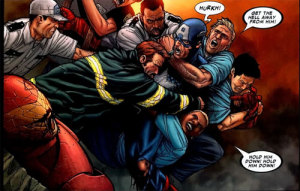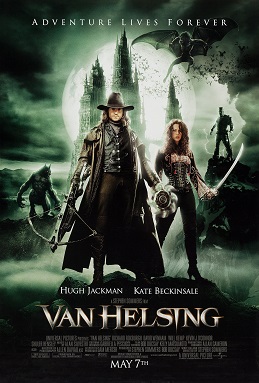I was going to take a break from geek media this week. I really, really was. Even started a different post yesterday. And then… well, and then this happened. In short, Marvel announced that Captain America 3 will feature Tony Stark, and will kick off (or possibly be) an adaptation of their 2006 event miniseries, Civil War.
Let me sum that up for you. After a group of superpowered youngsters trying to launch a reality series attacked a group of super villains in Stanford, Connecticut, leading to a massive explosion next to a school, the US government decides that maybe all these super heroes shouldn’t be running around unregulated and passes a law requiring anyone with powers to register their identity and powers.
I know, right? After a national tragedy the US government attempts to pass laws restricting the thing that made that tragedy possible. What kooky impossible scenario will those comic writers come up with next?
Anyhoo, Tony Stark leads the pro-registration charge, feeling that this law is both necessary and inevitable. Captain America isn’t sure about this, seeing it as encroaching on the liberties of his friends and allies, and when he’s informed by SHIELD that he either rounds up all of his friends who don’t register or gets shot full of tranq darts and thrown in a cell right about now, he goes on the run and forms the resistance.
Since the book was called “Civil War,” I think you can guess where things go from there.
You can see why Marvel Studios might be eager to bring this Captain America/Iron Man slugfest to the big screen, since despite its many flaws and frequent shipping delays it remains one of the biggest Marvel events of the last 10 years (not that the recent ones are anything to brag about, but still). And you know what? I’m not even going to speculate that they decided to do a movie about Iron Man and Captain America fighting because DC is doing a movie featuring Batman and Superman squaring off. Gonna give Marvel the benefit of the doubt here, and say that either this was already the plan when Batman V. Superman was announced, or they honestly don’t give two shits about what Warner Brothers and DC are up to, because why would they need to?
But maybe they should have given this one a little more thought. Because there are some real problems in trying to adapt it.
Here’s some examples.
Need actual armies for a war
The comic Civil War featured two entire armies of super heroes going at it. Dozens of A and B list characters at war in the streets while dozens more C and D list characters got rounded up by Iron Man’s forces. And as a reminder, one of the key issues involved divulging their secret identities to the government.
Right now, the entire Marvel Cinematic Universe has eight super heroes.
Eight.
Captain America, Iron Man, Thor, Hulk, Black Widow, Hawkeye, Falcon, and War Machine/Iron Patriot. Three of them don’t even have powers, and not a single damned one of them has a secret identity. Hell, three of them were government employees until SHIELD shut down, and one of them works for the military!
But that’s not entirely fair. Between now and May of 2016 that number will go up a bit. Between Age of Ultron, Ant-Man, and the launch of Daredevil on Netflix, they’ll be up to… let’s see… 12 super heroes. And one, maybe two secret identities.
Still not quite enough for a war, is it? Yes, they could introduce a wave of new super heroes through Agents of SHIELD… but will they? Will they really? They’ve shown no interest in doing that so far, and Agents of SHIELD might not last past this season if their ratings keep sliding. Which is a shame, because unlike this time last year, they really don’t deserve to be cancelled.
But it doesn’t really matter how many C-list heroes Agents of SHIELD introduces. There will still be some glaring absences.
They can’t do half the story
Here’s some key plot points from Civil War that the movies can’t realistically use.
- Spider-Man unmasks. The one big jaw-drop moment of Civil War was Spider-Man revealing his identity on public television, because Iron Man said he had to. There is some rumbling that Sony and Marvel might be nearing an agreement regarding Spider-Man, which would allow Marvel to use Spider-Man in their team-up movies, but Peter Parker had been Tony Stark’s right-hand man for months prior to Civil War in the comics. Tony Stark had become his friend, boss, and mentor, and that’s how he convinced Peter to unmask at all. Even if Marvel and Sony figure this out, they’re not going to be able to establish that bond between Age of Ultron and Captain America V. Iron Man: Dusk of Shwarma. Not unless they do some serious rewrites to Ant-Man.
- Tony Stark builds a super human prison in the Negative Zone. As part of the overall theme of “Tony Stark embodies the worst elements of the Bush administration, but we pretend it’s okay that he won for some reason,” Tony Stark built a prison to lock up all the unregistered super heroes in something called the Negative Zone. No, you don’t know what that is. Nor do the majority of the people who watch Marvel movies. So I can’t see them fitting it in. And odds are Fox is going to claim they own it, because it’s linked to the Fantastic Four. Hey, that reminds me…
- The Fantastic Four split up. Mr. Fantastic was on Tony’s side from day one, but Invisible Woman and Human Torch sided with the resistance and the Thing decided to emigrate (he didn’t get far). Aside from Cap and Iron Man being at each other’s throats, the Civil War splitting up Marvel’s first family was one of the big emotional beats. And since Fox would rather release a Fantastic Four movie they seem weirdly ashamed to talk about than give the rights back to Marvel, kiss that plot point goodbye. Why did Susan leave Reed? Well, it had something to do with…
- That clone of Thor that killed a fellow hero. Iron Man’s side accidentally drew first blood when their cyborg clone of Thor went a little nuts and killed Goliath, a fourth-string Giant Man knock-off. The only reason they had a clone of Thor is that the real Thor had been missing for quite a while, as Marvel had taken the character off the bench for a few years. So even if cyborg clones were something the Cinematic Universe did… and I guess there’s no reason it couldn’t be… why would they have a clone of Thor when the real Thor is right there? Unless he dies at the end of Age of Ultron or something–holy shit are they going to kill Thor in Age of Ultron? It would explain why they aren’t even talking about a third Thor movie…
- The Punisher joins Cap but Cap doesn’t know how he feels about that. Doesn’t sound like much of a plot point, but that is literally all that happened of note in issue five. Civil War spent three issues treading water and then crammed all the plot into one big fight scene in issue seven. But anyway, Marvel does own the Punisher again, but they’re not doing anything with him. Unless he turns up on Daredevil (he should), nobody in the Cinematic Universe knows or cares who the Punisher is, so this would be even less of a plot point than it was in the books.
So, yeah. Can’t do any of that. Well, maybe the Thor clone. And the problem is…
There’s not much plot left
Once you’ve taken out Spider-Man unmasking, the Thor clone killing Goliath, the Fantastic Four breaking up, the Negative Zone prison, Spider-Man switching sides, and the X-Men not giving a fuck, there’s barely any plot left. All you really have is Iron Man fights Captain America until the Real Heroes of 9/11 tackle Captain America and shame him into surrendering.

And is that really a whole movie? Is it?
Seriously, Civil War was the second most underwritten Marvel event in recent memory (the most underwritten was Secret Invasion, but that’s a whole other rant). Seven perpetually delayed issues with four issues’ worth of story and a hackneyed ending in which Iron Man happily sails a helicarrier into the sunset because normal people didn’t seem to mind all that terrible stuff he did, so it must have been okay. It set up interesting stories, as the Avengers were split into two teams, one team being anti-registration fugitives, and it led to the death of Captain America, but Civil War itself was all sizzle, no steak.
But when did Hollywood start minding that.
Moving along.
The actual plot doesn’t make any sense with the cinematic Avengers
So two things have to happen for this story to get going. Tony Stark has to support a government bill clamping down on super heroes, and Captain America has to oppose it. And both of those things have some problems through the lens of the Cinematic Universe.
Why, why I ask you, would the Tony Stark of the movies go along with this? It makes no sense. No sense at all. This isn’t the comic book Tony Stark who was Secretary of Defense until Scarlet Witch got him fired (yes, that’s basically what happened). This the movie Tony Stark, who basically flipped off a Senate committee while declaring he’d “privatized world peace.” The Tony Stark who, upon joining up with everyone on the SHIELD helicarrier in Avengers, spent as much time trying to figure out what SHIELD was up to as Loki. The Tony Stark who, we’re told, founded his own private spy agency in the wake of SHIELD’s collapse in The Winter Solider.
This is a Tony Stark who gives zero fucks about what the government thinks is best. Unless something in Age of Ultron happens to seriously change his perspective… and yes, I admit that it could… this Tony Stark seems completely unlikely to start chasing down Bruce Banner or Steve Rogers because some senator or general asks him to.
And then there’s Captain America. Cap opposed the registration act because of its violation of civil liberties, especially the “round up everyone who doesn’t give us their secret identity” part. But with no real secret identities in play, what’s driving this act? One theory I’ve heard is the whole “Your powers are too dangerous to be unregulated” angle.
Okay, I was just kidding around in the intro, but everyone sees how this then becomes about gun control, right? And Captain America would be the figure leading the charge against gun control. That’s… problematic. Captain America is always used as the face of what’s morally right in Marvel projects. Maybe it’s because I’m not from a flyover state, but given all the mass shootings that keep happening in the US, having their moral center on the other side of this issue is… well, it’s uncomfortable.
They’re going to make this movie. It’s going to be a hit, especially if rumours that Cap 3 is slowly becoming Avengers 2.5 are true. But it’ll have to be a HUGE hit to pay for all the additional cast it needs. And I thought that somebody should be bringing up all the ways in which trying to make this story work on screen is flawed.


